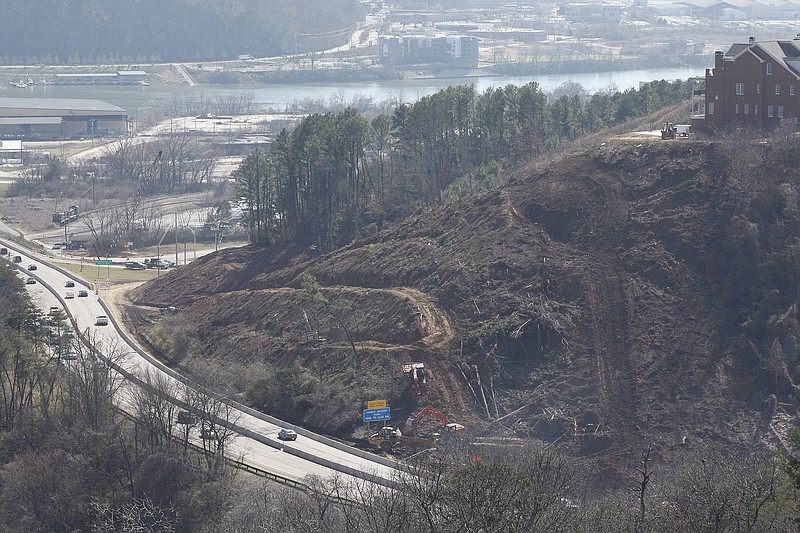(First in a monthly series)
Though we often complain about our government, we count on it every day, in large ways and small.
An example of a small way potholes - which don't seem like a small issue after they cause your tire(s) to blow out.
We count on our state and federal government to make sure that the utilitarian infrastructure of modern life - roads, right of way, transit, water safety, and access to basic telecommunications, including the internet - is sufficient to sustain the needs of citizens.
In 2014, for example, federal, state, and local governments spent $416 billion on infrastructure, according to the Congressional Budget Office (CBO).
Whether you live in a rural county (more than two-thirds of Tennessee counties are considered rural), an urban county (four or perhaps six counties), or somewhere in between, Tennesseans share a common complaint - it takes too long to drive to where we need go.
There is a lot of noise in the news about how bad traffic is Nashville, Memphis, Knoxville and Chattanooga, but those traffic woes are not unique and are felt far from city centers.
Think Tennessee, a public policy nonprofit, concluded in its analysis of 2016 census data the time Tennesseans spend commuting to work is a problem that extends beyond the borders of the state's major cities.
"With an average commute time of 24.5 minutes, there are few short drives to work in Tennessee," the organization reported in August, "but travel times are worst in the ring just beyond the suburbs."
Residents in the rural counties that surround our four major cities spend 25 percent more time commuting to work than their urban and suburban neighbors.
Rough roads, aging bridges, and other needs
Counties across Tennessee are faced with a growing backlog of transportation projects, estimated at $10 billion in January 2017. That backlog prompted the General Assembly to pass comprehensive legislation that took effect in July.
LEARN MORE
› Think Tennesseehttp://thinktennessee.org› The Beacon Center of Tennesseehttp://www.beacontn.orgCongressional Budget Officehttps://www.cbo.gov/publication/52463› Tennessee Department of Transportation (TDOT)Map of projects: https://www.tdot.tn.gov/projectneeds/spot#/› The IMPROVE Acthttps://www.tn.gov/content/tn/nexttennessee/improve-act.html› Tennessee Broadband Accessibility Acthttps://www.tn.gov/content/tn/nexttennessee/tennessee-broadband-accessibility-act.html› White House Infrastructure Planhttps://www.whitehouse.gov/wp-content/uploads/2018/02/INFRASTRUCTURE-211.pdfGovernor candidates› Diane Blackhttps://www.dianeblack.com› Randy Boydhttps://randyboyd.com› Karl Deanhttps://www.karldean.com› Craig Fitzhughhttps://craigfitzhugh.com› Beth Harwellhttps://bethharwell.com› Bill Leehttps://www.billlee.comSenate candidates› Marsha Blackburnhttps://www.marshablackburn.com› Philip Bredesenhttp://www.bredesen.com› Dr. Rolando Toyoshttps://toyosforsenate.com
The IMPROVE Act (Improving Manufacturing, Public Roads and Opportunities) raised taxes on gasoline, diesel fuel, compressed natural gas and liquefied gas and raised fees on motor vehicle registrations, including a new $100 fee for electric vehicles. To compensate for the tax increases, the legislation reduced the sales tax rate on food, established a phase out of the Hall income tax, and lowered taxes on manufacturers.
The net effect of the tax changes was to fund 962 road and bridge projects across all 95 counties while maintaining the commitment that Tennessee does not go into debt to fund road building and maintenance. The tax increases also provided $70 million a year for counties to invest in projects, and $35 million annually for cities.
The legislation also authorized local governments to raise local taxes to pay for transit projects. In Nashville, for example, voters will decide in May whether to authorize more than $5 billion in bonds to build transit system, which would include a light rail system and tunnels under downtown. The revenue bonds would be financed by an increase in the local option sales and use tax, hotel occupancy tax, business tax and local rental car tax.
The passage of the IMPROVE Act reduced Tennessee's reliance on federal funding to pay for transportation projects from about 55 percent of expenditures to about 47 percent of expenditures, but the state is dependent on continued robust federal spending from the Highway Trust Fund. The Highway Trust Fund is funded by the federal gas tax, which has not been changed since 1993, and the CBO projects that the Highway Trust Fund's revenues will be insufficient to meet its obligations by 2021.
In February, President Donald Trump proposed a $200 billion infrastructure spending plan that puts an emphasis on increased funding from state and local governments and private investors. The plan "addresses more than traditional infrastructure – like roads, bridges, and airports – but addresses other needs like drinking and wastewater systems, waterways, water resources, energy, rural infrastructure, public lands, veterans' hospitals, and Brownfield and Superfund sites."
The impact of the president's proposal on how much federal funding will pay for Tennessee projects is uncertain.
21st century highways
In the last century, infrastructure investment was focused on moving people, but today's infrastructure must include how well we move information.
The state Department of Economic and Community Development reported in July 2016 that an assessment of Tennessee businesses showed that 43 percent of net new jobs and 66 percent of new revenues were enabled by access to broadband internet, and that 34 percent of businesses said that access to broadband was essential to choosing where they located.
The ECD assessment also reported that more than 800,000 Tennesseans did not have access to high-speed internet, and more than 25 percent of households and businesses with access to some form of high-speed internet did not have high quality access. While only two percent of people living in urban areas did not have access to high quality internet, 34 percent of rural residents did not have access.
The legislature enacted the Tennessee Broadband Accessibility Act in May to improve high speed internet access.
The many other infrastructure needs in Tennessee are overshadowed by the huge investment in transportation until they fail. How prepared are our political leaders for that?
Let us know what issues are crucial to you.
Frank Daniels lives in Clarksville. A former editor and columnist, he is a member of the N.C. Journalism Hall of Fame. Contact him at fdanielsiii@mac.com.

